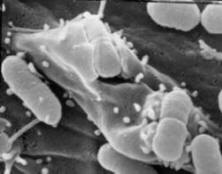Health Scan: New test studies how bacteria spread disease
By Judy Siegel A way to monitor toxic bacteria, designed by Hebrew University researchers, could pave way for new antibiotics. The system is being called a "breakthrough" in monitoring the toxin-delivery system of highly pathogenic bacteria, as it could help pave the way for new drugs capable of neutralizing those germs.
Most bacteria are harmless. Some, however, are pathogenic and equipped with special accessories used to deliver toxins (also termed "effectors") into the cells of an infected person.
Bacteria that can result in anything from food poisoning to life-threatening infection use a syringe-like nano-organelle (a specialized part of a cell having a specific function) to inject toxic effectors into host cells. This process is termed a type III secretion system (TTSS). Among these pathogens are Salmonella; the cause of typhoid fever, Yersinia; and intestinal E. coli, which is responsible for the death of up to a million infants per year.
The bacterial syringe is an excellent potential target for as-yet-unavailable drugs. But to develop such drugs, scientists need to better understand syringe functions and develop improved methods for measuring syringe activity.
The HU researchers - Prof. Ilan Rosenshine (a bacteriology expert at the medical faculty) and colleagues Erez Mills, Kobi Baruch, Xavier Charpentier and Simi Kobi have designed a new, real-time test that allows monitoring of syringe activity. Using this test, they have discovered new properties of this system which might be used to develop drugs that will inhibit the activity and thereby prevent disease and infection.
Their achievement was described in a recent article in Cell Host & Microbe.
DIABETES AND HEARING
Hearing loss is twice as common in diabetics than in healthy people, according to US researchers who advise adults with diabetes to have their hearing checked.
Dr. Catherine Cowie of the US National Institute of Diabetes and Digestive and Kidney Diseases in Maryland told UPI that the link between diabetes and hearing loss is evident across all frequencies, with a stronger association in the high-frequency range. Mild or greater hearing impairment of low- or mid-frequency sounds in the worse ear was about 21 percent in 399 adults with diabetes, compared to about 9% in 4,741 adults without diabetes, Cowie says.
The study, published in the Annals of Internal Medicine, found that adults with metabolic syndrome (pre-diabetes) had a 30%higher rate of hearing loss compared to those with normal blood sugar. "Hearing loss may be an under-recognized complication of diabetes," Cowie said. "Our study found a strong and consistent link between hearing impairment and diabetes using a number of different outcomes."
SUPPRESSING A RIOT OF CELLS
A new approach to fighting autoimmune disease - in which the immune system turns against the body's own tissues and organs for no apparent reason - has been developed by Weizmann Institute researchers. Partly because the origins of these diseases are so obscure, no effective treatment exists, and the suffering they inflict is enormous. But a method that may make it possible to treat autoimmune diseases effectively without necessarily knowing their exact cause has been developed in the Rehovot institute. The approach is equivalent to sending a police force to suppress a riot without seeking out the individuals who instigated the unrest.
In healthy people, a small but crucial group of immune cells called regulatory T cells, or T-regs, keeps autoimmunity in check, but in people with inflammatory bowel disease (IBD) - one of the most common autoimmune disorders - too few of these cells appear in the diseased intestine, and the ones that do fail to function properly. The new approach consists of delivering highly selective, genetically engineered functioning T-regs to the intestine.
The cells produced what the scientists called a "bystander" effect: They were directed to the diseased tissue using neighboring, or "bystander" markers that identified the area as a site of inflammation, and suppressed the inflammatory cells in the vicinity by secreting soluble suppressive substances. The scientists, who are currently experimenting with human T-regs for curing ulcerative colitis, believe that in addition to IBD, their "bystander" approach could work in other autoimmune disorders, even if the causes remain unknown. They also think the method could be valuable in suppressing unwanted inflammation in diseases unrelated to autoimmunity, as well as in preventing graft rejection and certain complications in bone marrow and organ transplantation. . |